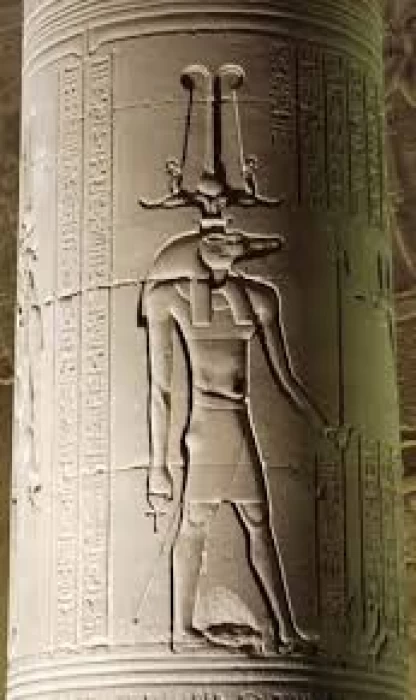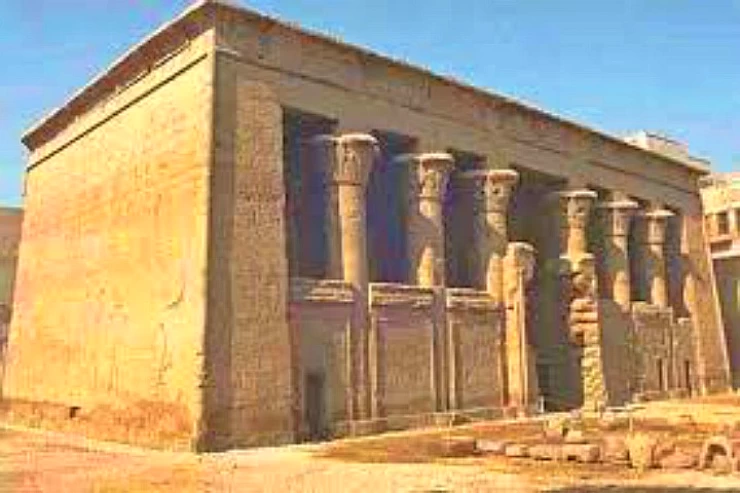
Deus Sobek
Deus Sobek
God Sobek é considerado um patrono do exército egípcio, um defensor do Faraó.
Ele foi amplamente adorado durante o antigo reino. O nome de Sobek encontra-se nos Textos da Pirâmide, o mais antigo corpus conhecido de textos religiosos egípcios antigos.
Nos Textos da Pirâmide Unas, diz-se que o faraó Unas é "Sobek com uma pena verde, com o rosto atento, com a fronte erguida".
A consorte de Sobek difere de lugar para lugar, embora as deusas mais comumente emparelhadas com ele sejam Hathor, Renenutet, Heqet, e Tawaret. Além disso, Sobek é por vezes referido como o pai de Khonsu, Khnum, ou Horus.
Diz-se que Sobek é o filho de Neith, outra velha divindade do antigo panteão egípcio. Diz-se que Neith deu à luz os seus filhos sem um parceiro. Noutros, porém, acredita-se que Seth foi o pai de Sobek. No entanto, noutros relatos, diz-se que Sobek emergiu das águas primordiais de Nun.
Um mito dizia que o deus crocodilo criou o mundo e o Nilo foi formado a partir do seu suor. A associação de Sobek com o Nilo também significava que ele era considerado como um deus da fertilidade que era responsável por assegurar a fertilidade da terra. Noutro mito, Sobek criou o mundo ao pôr ovos nas margens das águas do Nilo.
Os deuses do antigo Egipto eram muito semelhantes aos humanos que amavam e odiavam, sentiam ciúmes e lutavam, vingaram-se, mataram e também morreram durante um mito surpreendente cheio de alegria, acção e acontecimentos dramáticos que inspiraram os realizadores e produtores de cinema modernos a criar filmes mundialmente famosos sobre a grandeza dos faraós e dos deuses que adoravam.
Gostaria de viver uma viagem através da cultura e mitologia egípcias antigas? pode fazê-lo acontecer e passar um dia a visitar Abydos, Giza, Luxor, Assuão para ver os túmulos dos Faraós adornados com cenas muito claras, detalhadas e belamente pintadas das várias divindades do antigo Egipto, bem como muitos outros locais, cidades, aventuras e coisas para fazer no Cairo, pode tentar reservar um dos nossos pacotes de viagens ao Egipto e muitos grupos privados de excursões guiadas de um dia no Cairo a partir do aeroporto e de um dia no Egipto para explorar a capital do Egipto, Cairo pode verificar muitos dos itinerários do Egipto ou fazer uma das nossas excursões de um dia inteiro no Cairo, como por exemplo:
God Sobek is considered to be a patron of the Egyptian army and a defender of the Pharaoh. He was worshiped widely during the old kingdom. Sobek’s name is found in the Pyramid Texts, the oldest known corpus of ancient Egyptian religious texts. In the Unas Pyramid Texts, the pharaoh Unas is said to be “Sobek with a green feather, with watchful face, with uplifted brow”.
Sobek was the crocodile god of the Nile River, and it is known that the ancient Egyptians feared and respected the power of crocodiles, so «Sobek» was considered. As a shepherd of soldiers and protector of the pharaohs, he was also a god who would restore souls damaged in battle or death to their previous physical health, including their sight and senses... In some ancient Egyptian texts, he was the god of creation and was believed to have created the earth.
In some legends, Sobek recovered four sons of Horus from the Nile when they emerged from the lotus flower by hunting them in nets, and the sons of Horus were protectors «liver, stomach, lungs, and intestines». «Sobek» was usually closely associated with Horus, and was sometimes mentioned as having helped deliver Horus when he was born, and was also associated with Horus because Horus turned into a crocodile to retrieve his father, Osiris, when he turned into a group scattered throughout the Earth.
The consort of Sobek differs from place to place, though the goddesses most commonly paired with him are Hathor, Renenutet, Heqet, and Tawaret. Additionally, Sobek is sometimes referred to as the father of Khonsu, Khnum, or Horus.
She was the spouse of Sobek Reninotet, the serpent goddess who guarded the fertility and crops of the pharaohs. Khonsu, the son of the couple, was revered as the moon and time god.
Sobek is said to be the son of Neith, another old deity of the ancient Egyptian pantheon. Neith is said to have given birth to her children without a partner. In others, however, it is believed that Seth was the father of Sobek. Yet in other accounts, Sobek is said to have emerged out of the primeval waters of Nun.
A myth said that the crocodile god created the world and the Nile was formed from his sweat. Sobek’s association with the Nile also meant that he was regarded as a fertility god who was responsible for ensuring the fertility of the land. In another myth, Sobek created the world by laying eggs on the bank of the waters of Nun.
The Gods of ancient Egypt were very much like humans they loved and hated, they felt jealous and fought, they took revenge, killed, and also died during an amazing myth full of joyful, action, and dramatic events that inspired modern movie directors and producers to create world-famous movies about the grandeur of the Pharaohs and the Gods they worshipped.
The cult of Sobek was one of the oldest cults in ancient Egypt. The god first appeared in a seal from the reign of King Narmer, the first ruler of the First Dynasty. The seal shows Nile crocodiles facing a specially designed shrine. Later, this shrine became a symbol of the ancient city of Shidet (present-day Fayoum).
After the end of the Old Kingdom, the god Sobek became famous as a local god of Sumino, a region in the Theban region. Sobek's followers had been worshiping him there since a Heraclopolitic period.
This was the time when the Ninth and Tenth Dynasties ruled Egypt from the Delta region. But the matter ended with the ruling family taking control of Upper and Lower Egypt in the eleventh century by the kings of Thebes.
During the reign of Amenemhat III, the cult of Sobek in Sumino grew dramatically and became the second most popular cult after Shidet.
The crocodile has been associated with the Egyptians since ancient Pharaonic times. It was a symbol of both good and evil, as it appeared in a contradictory way among the ancient Egyptians, between sanctification, hatred and desecration. It was a symbol of the god Sobek, who in the era represented the "key to life", the symbol of life, but it was also a symbol of Satan among others.








-webp.webp)







